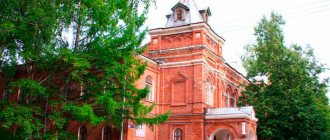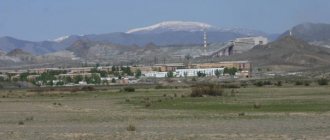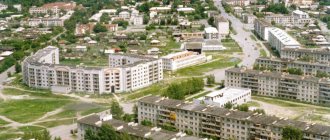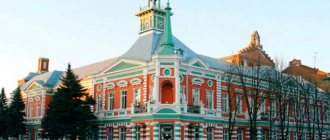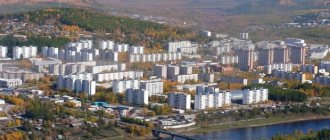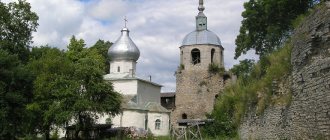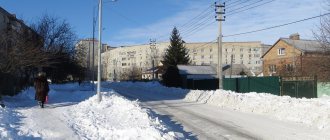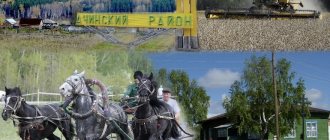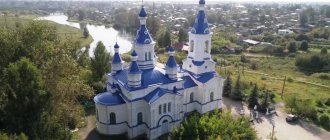City in Komi Republic, Russia
| Sosnogorsk Sosnogorsk | |
| Town[1] | |
| Other transcription(s) | |
| • Komi | Sӧsnagort |
| Sosnogorsk railway station | |
| Flag Coat of arms | |
| Location of Sosnogorsk | |
| Sosnogorsk Location of Sosnogorsk Show map of Russia Sosnogorsk Sosnogorsk (Komi Republic) Show map of the Komi Republic | |
| Coordinates: 63°36′N 53°54'E / 63.600°N Latitude 53.900°E / 63.600; 53.900Coordinates: 63°36′N 53°54'E / 63.600°N W. 53.900° E. / 63.600; 53.900 | |
| A country | Russia |
| Federal subject | Komi Republic[1] |
| Based | 1939 |
| Government | |
| • Head | Natalya Kupetskova |
| population (2010 Census)[2] | |
| • General | 27,757 |
| • Evaluate (2018)[3] | 26,388 (−4.9%) |
| Administrative status | |
| • Subordinate | city of republican significance Sosnogorsk[1] |
| • Capital from | city of republican significance Sosnogorsk[1] |
| Municipal status | |
| • Municipal district | Sosnogorsk municipal district[4] |
| • Urban village | Urban settlement Sosnogorsk[4] |
| • Capital from | Sosnogorsk municipal district[4], urban-type settlement Sosnogorsk[4] |
| Timezone | UTC + 3 (MSK [5]) |
| Postal code(s)[6] | 169500–169502, 169509 |
| Dial code(s) | +7 82149 |
| OKTMO I WOULD | 87626122001 |
| Web site | network.archive.org/ Internet/20090604053058/ https:// www.sosnogorsk.org/ |
Sosnogorsk
(Russian: Sosnógorsk; Komi: Сӧснагорт,
Sösnagort
) is a town in the Komi Republic, Russia, located on the Izhma River. Population: 27,757 (2010 Census);[2]29,587 (2002 Census);[7]30,439 (1989 Census).[8]
Administrative and municipal status
Within the structure of administrative units, the town of Sosnogorsk together with two administrative territories of urban-type settlements (including urban-type settlements of Voyvozh and Nizhny Odessa and three rural areas) and thirteen rural settlements included in the city of republican significance of Sosnogorsk
- an administrative unit with a status equal to that of a district.[1]
As a municipal entity, the city of republican significance Sosnogorsk is included as the Sosnogorsk municipal district
;
the city of Sosnogorsk and thirteen rural settlements are included in its composition as the Urban Settlement of Sosnogorsk
.[4] Two administrative territories of urban-type settlements are united into two urban settlements within the municipal district.[4]
Recommendations
Notes
- ^ a b c d f
Law No. 16-RZ - ^ a b
Federal State Statistics Service of Russia (2011).
“All-Russian Population Census 2010. Volume 1" [All-Russian Population Census 2010, vol. 1]. All-Russian Population Census 2010 [All-Russian Population Census 2010]
(in Russian). Federal State Statistics Service. - "26. The size of the permanent population of the Russian Federation by municipalities as of January 1, 2022.” Federal State Statistics Service. Retrieved January 23, 2022.
- ^ a b c d f g
Law No. 11-RZ - "On the calculation of time." Official Internet portal of legal information
(in Russian). June 3, 2011. Retrieved January 19, 2022. - Post office. Information and computing center of OASU RPO. ( Post office
).
Search for postal facilities ( Search for postal facilities
) (in Russian) - Federal State Statistics Service of Russia (May 21, 2004). “The population of Russia, the constituent entities of the Russian Federation as part of federal districts, urban settlements, urban settlements, settlements, settlements of 3 thousand or more people.” [Population of Russia, its federal districts, federal subjects, districts, urban settlements, rural settlements - administrative centers, rural settlements with a population of more than 3000 people] (XLS). All-Russian Population Census of 2002 [All-Russian Population Census of 2002]
(in Russian). - “All-Union Population Census of 1989. The actual population of the union and autonomous republics, autonomous regions and districts, territories, regions, urban settlements and villages. "
Sources
- State Council of the Komi Republic. Law No. 13-RZ of March 6, 2006 “On the administrative-territorial structure of the Komi Republic,” as amended. Law No. 171-RZ of December 26, 2014 “On the abolition of the settlement of Verkhnyaya Sedka, located on the territory of the Priluzsky district of the Komi Republic, and in connection with this amendments to some Laws of the Komi Republic.” Came into force on the date of official publication. Published: “Respublika”, No. 44, March 16, 2006 (State Council of the Komi Republic. Law of March 6, 2006 No. 16-RZ On the administrative-territorial structure of the Komi Republic
As amended by the Law of December 26, 2014 No. 171- RZ.
On the abolition of the settlement of Verkhnyaya Sedka, located on the territory of the Priluzsky district of the Komi Republic, and on amendments to various laws of the Komi Republic, respectively
. Effective from the date of official publication.). - State Council of the Komi Republic. Law No. 11-RZ of March 5, 2005 “On the territorial organization of local self-government in this Komi”, as amended. Law No. 171-RZ of December 26, 2014 “On the abolition of the settlement of Verkhnyaya Sedka, located on the territory of the Priluzsky district of the Komi Republic, and in connection with this amendments to some Laws of the Komi Republic.” Entered into force on April 1, 2005. Published: “Respublika”, No. 44–45, March 17, 2005 (State Council of the Komi Republic. Law of March 5, 2005 No. 11-RZ On the territorial organization of local self-government in the Komi Republic
As amended by Law No. 171-RZ of December 26, 2014.
On the abolition of the settlement of Verkhnyaya Sedka, located on the territory of the Priluzsky district of the Komi Republic, and on amendments to various laws of the Komi Republic
, respectively. Effective from April 1, 2005).
Excerpt characterizing Sosnogorsk
“Uh, uh, uh!..” it was as if the Tatar was grunting, and suddenly, raising his high-cheekboned, black, snub-nosed face, baring his white teeth, he began to tear, twitch and squeal with a piercing, ringing, drawn-out squeal. On another table, around which a lot of people were crowding, a large, plump man with his head thrown back lay on his back (the curly hair, its color and the shape of the head seemed strangely familiar to Prince Andrei). Several paramedics leaned on this man's chest and held him. The white, large, plump leg twitched quickly and frequently, without ceasing, with feverish tremors. This man was sobbing convulsively and choking. Two doctors silently - one was pale and trembling - were doing something on the other, red leg of this man. Having dealt with the Tatar, on whom an overcoat had been thrown, the doctor in glasses, wiping his hands, approached Prince Andrei. He looked into the face of Prince Andrei and hastily turned away. - Undress! What are you standing for? – he shouted angrily at the paramedics. Prince Andrei remembered his very first distant childhood, when the paramedic, with his hasty, rolled-up hands, unbuttoned his buttons and took off his dress. The doctor bent low over the wound, felt it and sighed heavily. Then he made a sign to someone. And the excruciating pain inside the abdomen made Prince Andrei lose consciousness. When he woke up, the broken thigh bones had been removed, chunks of flesh had been cut off, and the wound had been bandaged. They threw water in his face. As soon as Prince Andrei opened his eyes, the doctor bent over him, silently kissed him on the lips and hurriedly walked away. After suffering, Prince Andrei felt a bliss that he had not experienced for a long time. All the best, happiest moments in his life, especially his earliest childhood, when they undressed him and put him in his crib, when the nanny sang over him, lulling him to sleep, when, burying his head in the pillows, he felt happy with the sheer consciousness of life - he imagined to the imagination not even as the past, but as reality. Doctors were fussing around the wounded man, the outline of whose head seemed familiar to Prince Andrei; they lifted him up and calmed him down. – Show me... Ooooh! O! oooooh! – one could hear his groan, interrupted by sobs, frightened and resigned to suffering. Listening to these moans, Prince Andrei wanted to cry. Was it because he was dying without glory, was it because he was sorry to part with his life, was it because of these irretrievable childhood memories, was it because he suffered, that others suffered, and this man moaned so pitifully in front of him, but he wanted to cry childish, kind, almost joyful tears. The wounded man was shown a severed leg in a boot with dried blood. - ABOUT! Ooooh! - he sobbed like a woman. The doctor, standing in front of the wounded man, blocking his face, moved away. - My God! What is this? Why is he here? - Prince Andrei said to himself. In the unfortunate, sobbing, exhausted man, whose leg had just been taken away, he recognized Anatoly Kuragin. They held Anatole in their arms and offered him water in a glass, the edge of which he could not catch with his trembling, swollen lips. Anatole was sobbing heavily. “Yes, it’s him; “Yes, this man is somehow closely and deeply connected with me,” thought Prince Andrei, not yet clearly understanding what was in front of him. – What is this person’s connection with my childhood, with my life? - he asked himself, not finding an answer. And suddenly a new, unexpected memory from the world of childhood, pure and loving, presented itself to Prince Andrei. He remembered Natasha as he had seen her for the first time at the ball in 1810, with a thin neck and thin arms, with a frightened, happy face ready for delight, and love and tenderness for her, even more vivid and stronger than ever, awoke in his soul. He now remembered the connection that existed between him and this man, who, through the tears that filled his swollen eyes, looked dully at him. Prince Andrei remembered everything, and enthusiastic pity and love for this man filled his happy heart. Prince Andrei could no longer hold on and began to cry tender, loving tears over people, over himself and over them and his delusions. “Compassion, love for brothers, for those who love, love for those who hate us, love for enemies - yes, that love that God preached on earth, which Princess Marya taught me and which I did not understand; That’s why I felt sorry for life, that’s what was still left for me if I were alive. But now it's too late. I know it!" The terrible sight of the battlefield, covered with corpses and wounded, combined with the heaviness of the head and with the news of the killed and wounded twenty familiar generals and with the awareness of the powerlessness of his previously strong hand, made an unexpected impression on Napoleon, who usually loved to look at the dead and wounded, thereby testing his spiritual strength (as he thought). On this day, the terrible sight of the battlefield defeated the spiritual strength in which he believed his merit and greatness. He hastily left the battlefield and returned to the Shevardinsky mound. Yellow, swollen, heavy, with dull eyes, a red nose and a hoarse voice, he sat on a folding chair, involuntarily listening to the sounds of gunfire and not raising his eyes. With painful melancholy he awaited the end of that matter, which he considered himself to be the cause of, but which he could not stop. Personal human feeling for a short moment took precedence over that artificial ghost of life that he had served for so long. He endured the suffering and death that he saw on the battlefield. The heaviness of his head and chest reminded him of the possibility of suffering and death for himself. At that moment he did not want Moscow, victory, or glory for himself. (What more glory did he need?) The only thing he wanted now was rest, peace and freedom. But when he was at Semenovskaya Heights, the chief of artillery suggested that he place several batteries at these heights in order to intensify the fire on the Russian troops crowded in front of Knyazkov. Napoleon agreed and ordered news to be brought to him about what effect these batteries would produce. The adjutant came to say that, by order of the emperor, two hundred guns were aimed at the Russians, but that the Russians were still standing there. “Our fire takes them out in rows, but they stand,” said the adjutant. “Ils en veulent encore!.. [They still want it!..],” Napoleon said in a hoarse voice. - Sire? [Sovereign?] - repeated the adjutant who did not listen. “Ils en veulent encore,” Napoleon croaked, frowning, in a hoarse voice, “donnez leur en.” [If you still want to, well, ask them.] And without his order, what he wanted was done, and he gave orders only because he thought that orders were expected from him. And he was again transported to his former artificial world of ghosts of some kind of greatness, and again (like that horse walking on a sloping drive wheel imagines that it is doing something for itself) he obediently began to perform that cruel, sad and difficult, inhuman the role that was intended for him. And it was not just for this hour and day that the mind and conscience of this man, who bore the brunt of what was happening more heavily than all the other participants in this matter, were darkened; but never, until the end of his life, could he understand either goodness, beauty, truth, or the meaning of his actions, which were too opposite to goodness and truth, too far from everything human for him to understand their meaning. He could not renounce his actions, praised by half the world, and therefore had to renounce truth and goodness and everything human. Not only on this day, driving around the battlefield, strewn with dead and mutilated people (as he thought, by his will), he, looking at these people, counted how many Russians there were for one Frenchman, and, deceiving himself, found reasons to rejoice that for every Frenchman there were five Russians. Not only on this day did he write in a letter to Paris that le champ de bataille a ete superbe [the battlefield was magnificent] because there were fifty thousand corpses on it; but also on the island of St. Helena, in the quiet of solitude, where he said that he intended to devote his leisure time to the exposition of the great things that he had done, he wrote: “La guerre de Russie eut du etre la plus populaire des temps modernes: c 'etait celle du bon sens et des vrais interets, celle du repos et de la securite de tous; elle etait purement pacifique et conservatrice. C'etait pour la grande cause, la fin des hasards elle commencement de la securite. Un nouvel horizon, de nouveaux travaux allaient se derouler, tout plein du bien etre et de la prosperite de tous. Le systeme europeen se trouvait fonde; il n'etait plus question que de l'organiser. Satisfait sur ces grands points et tranquille partout, j'aurais eu aussi mon congress et ma sainte alliance. Ce sont des idees qu'on m'a volees. Dans cette reunion de grands souverains, nous eussions traites de nos interets en famille et compte de clerc a maitre avec les peuples. L'Europe n'eut bientot fait de la sorte veritablement qu'un meme peuple, et chacun, en voyageant partout, se fut trouve toujours dans la patrie commune. Il eut demande toutes les rivieres navigables pour tous, la communaute des mers, et que les grandes armees permanentes fussent reduites desormais a la seule garde des souverains. De retour en France, au sein de la patrie, grande, forte, magnifique, tranquille, glorieuse, j'eusse proclame ses limites immuables; toute guerre future, purement defensive; tout agrandissement nouveau antinational. J'eusse associe mon fils a l'Empire; ma dictature eut fini, et son regne constitutionnel eut commence... Paris eut ete la capitale du monde, et les Francais l'envie des nations!.. Mes loisirs ensuite et mes vieux jours eussent ete consacres, en compagnie de l'imperatrice et durant l'apprentissage royal de mon fils, a visiter lentement et en vrai couple campagnard, avec nos propres chevaux, tous les recoins de l'Empire, recevant les plaintes, redressant les torts, semant de toutes parts et partout les monuments et les bienfaits. The Russian war should have been the most popular in modern times: it was a war of common sense and real benefits, a war of peace and security for everyone; she was purely peace-loving and conservative. It was for a great purpose, for the end of chance and the beginning of peace. A new horizon, new works would open, full of prosperity and well-being for all. The European system would have been founded, the only question would be its establishment. Satisfied in these great matters and everywhere calm, I too would have my congress and my sacred alliance. These are the thoughts that were stolen from me. In this meeting of great sovereigns, we would discuss our interests as a family and would take into account the peoples, like a scribe with an owner. Europe would indeed soon constitute one and the same people, and everyone, traveling anywhere, would always be in a common homeland. I would argue that all rivers should be navigable for everyone, that the sea should be common, that permanent, large armies should be reduced solely to the guards of sovereigns, etc. Returning to France, to my homeland, great, strong, magnificent, calm, glorious, I would proclaim its borders unchanged; any future defensive war; any new spread is anti-national; I would add my son to the government of the empire; my dictatorship would end, and his constitutional rule would begin... Paris would be the capital of the world and the French would be the envy of all nations!.. Then my leisure time and last days would be devoted, with the help of the Empress and during the royal upbringing of my son, to to little by little visit, like a real village couple, on their own horses, all corners of the state, accepting complaints, eliminating injustices, scattering buildings and blessings in all directions and everywhere.] He, destined by Providence for the sad, unfree role of the executioner of nations, assured himself, that the purpose of his actions was the good of the people and that he could guide the destinies of millions and do good deeds through power! “Des 400,000 hommes qui passerent la Vistule,” he wrote further about the Russian war, “la moitie etait Autrichiens, Prussiens, Saxons, Polonais, Bavarois, Wurtembergeois, Mecklembourgeois, Espagnols, Italiens, Napolitains. L'armee imperiale, proprement dite, etait pour un tiers composee de Hollandais, Belges, habitants des bords du Rhin, Piemontais, Suisses, Genevois, Toscans, Romains, habitants de la 32 e division militaire, Breme, Hambourg, etc.; elle comptait a peine 140000 hommes parlant francais. L'expedition do Russie couta moins de 50000 hommes a la France actuelle; l'armee russe dans la retraite de Wilna a Moscou, dans les differentes batailles, a perdu quatre fois plus que l'armee francaise; l'incendie de Moscou a coute la vie a 100000 Russes, morts de froid et de misere dans les bois; enfin dans sa marche de Moscou a l'Oder, l'armee russe fut aussi atteinte par, l'intemperie de la saison; “elle ne comptait a son arrivee a Wilna que 50,000 hommes, et a Kalisch moins de 18,000.”
